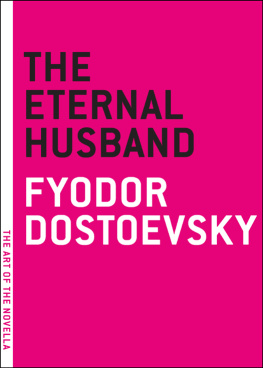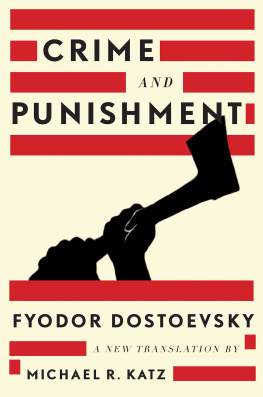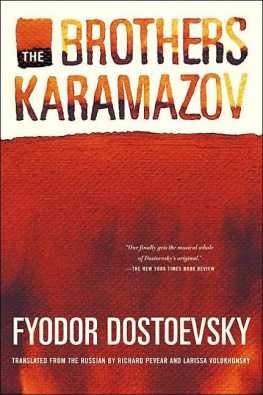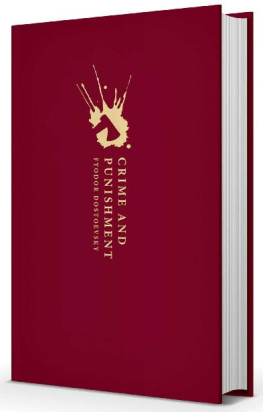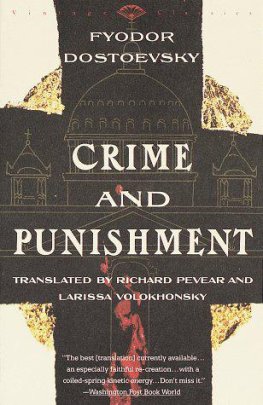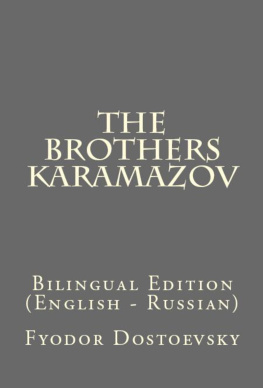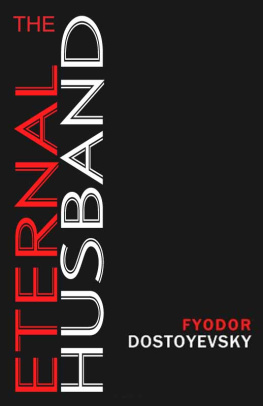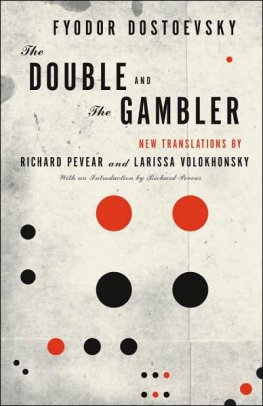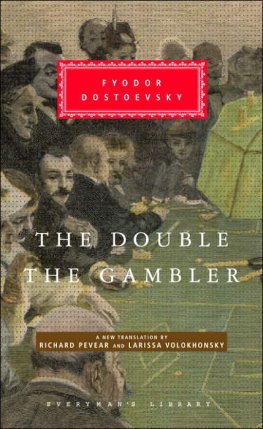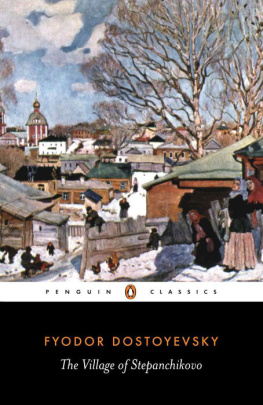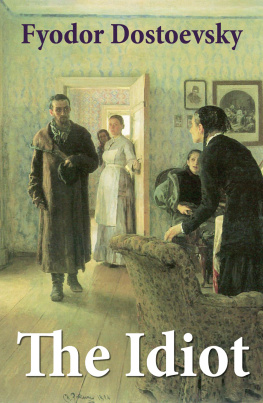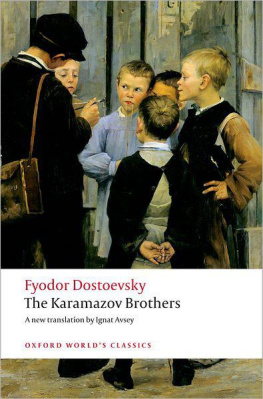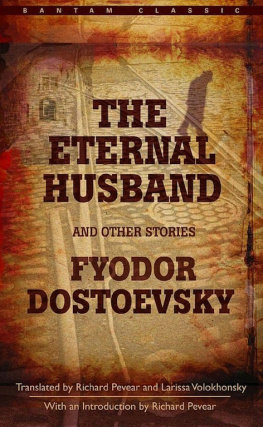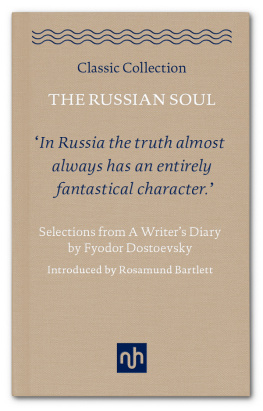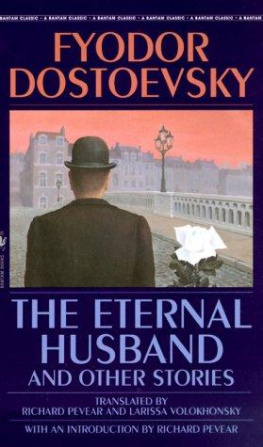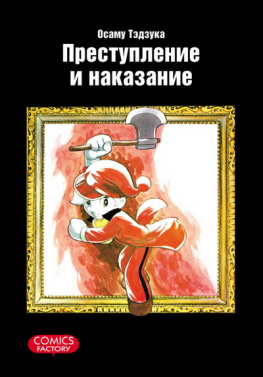Fyodor Dostoevsky - The Eternal Husband
Here you can read online Fyodor Dostoevsky - The Eternal Husband full text of the book (entire story) in english for free. Download pdf and epub, get meaning, cover and reviews about this ebook. year: 2012, publisher: Melville House Publishing, genre: Art. Description of the work, (preface) as well as reviews are available. Best literature library LitArk.com created for fans of good reading and offers a wide selection of genres:
Romance novel
Science fiction
Adventure
Detective
Science
History
Home and family
Prose
Art
Politics
Computer
Non-fiction
Religion
Business
Children
Humor
Choose a favorite category and find really read worthwhile books. Enjoy immersion in the world of imagination, feel the emotions of the characters or learn something new for yourself, make an fascinating discovery.
- Book:The Eternal Husband
- Author:
- Publisher:Melville House Publishing
- Genre:
- Year:2012
- Rating:3 / 5
- Favourites:Add to favourites
- Your mark:
- 60
- 1
- 2
- 3
- 4
- 5
The Eternal Husband: summary, description and annotation
We offer to read an annotation, description, summary or preface (depends on what the author of the book "The Eternal Husband" wrote himself). If you haven't found the necessary information about the book — write in the comments, we will try to find it.
The Eternal Husband — read online for free the complete book (whole text) full work
Below is the text of the book, divided by pages. System saving the place of the last page read, allows you to conveniently read the book "The Eternal Husband" online for free, without having to search again every time where you left off. Put a bookmark, and you can go to the page where you finished reading at any time.
Font size:
Interval:
Bookmark:

MELVILLE HOUSE PUBLISHING
145 PLYMOUTH STREET
BROOKLYN, NY 11201 WWW.MHPBOOKS.COM
The Library of Congress has cataloged the paperback edition as follows: Dostoyevsky, Fyodor, 1821-1881.
[Vechnyi muzh. English]
The eternal husband / by Fyodor Dostoevsky; translated by Constance Garnett.
p. cm.
eISBN: 978-1-61219-239-0
I. Garnett, Constance Black, 1862-1946. II. Title.
PG3326.V5 2005
891.733dc22 2005010707 v3.1
Contents
I VELCHANINOV
The summer had come and, contrary to expectations, Velchaninov remained in Petersburg. The trip he had planned to the south of Russia had fallen through, and the end of his case was not in sight. This casea lawsuit concerning an estatehad taken a very unfortunate turn. Three months earlier it had appeared to be quite straightforward, almost impossible to contest; but suddenly everything was changed. And, in fact, everything has changed for the worse! Velchaninov began frequently and resentfully repeating that phrase to himself. He was employing an adroit, expensive, and distinguished lawyer, and was not sparing money; but through impatience and lack of confidence he had been tempted to meddle in the case himself too. He read documents and wrote statements which the lawyer rejected pointblank, ran from one court to another, collected evidence, and probably hindered everything; the lawyer complained, at any rate, and tried to pack him off to a summer villa. But Velchaninov could not even make up his mind to go away. The dust, the stifling heat, the white nights of Petersburg, that always fret the nerves were what he was enjoying in town. His flat was near the Grand Theatre; he had only recently taken it, and it, too, was a failure. Everything is a failure! he thought. His nervousness increased every day; but he had for a long time past been subject to nervousness and hypochondria.
He was a man whose life had been full and varied, he was by no means young, thirty-eight or even thirty-nine, and his old age, as he expressed it himself, had come upon him quite unexpectedly; but he realized himself that he had grown older less by the number than by the quality, so to say, of his years, and that if he had begun to be aware of waning powers, the change was rather from within than from without. In appearance he was still strong and hearty. He was a tall, sturdily-built fellow, with thick flaxen hair without a sign of greyness and a long fair beard almost half-way down his chest; at first sight he seemed somewhat slack and clumsy, but if you looked more attentively, you would detect at once that he was a man of excellent breeding, who had at some time received the education of an aristocrat. Velchaninovs manners were still free, assured and even gracious, in spite of his acquired grumpiness and slackness. And he was still, even now, full of the most unhesitating, the most snobbishly insolent self-confidence, the depth of which he did not himself suspect, although he was a man not merely intelligent, but even sometimes sensible, almost cultured and unmistakably gifted. His open and ruddy face had been in old days marked by a feminine softness of complexion which attracted the notice of women; and even now some people, looking at him, would say: What a picture of health! What a complexion! And yet this picture of health was cruelly subject to nervous depression. His eyes were large and blue, ten years earlier they had possessed great fascination; they were so bright, so gay, so careless that they could not but attract every one who came in contact with him. Now that he was verging on the forties, the brightness and good-humour were almost extinguished. Those eyes, which were already surrounded by tiny wrinkles, had begun to betray the cynicism of a worn-out man of doubtful morals, a duplicity, an ever-increasing irony and another shade of feeling, which was new: a shade of sadness and of paina sort of absent-minded sadness as though about nothing in particular and yet acute. This sadness was especially marked when he was alone. And, strange to say, this man who had been only a couple of years before fond of noisy gaiety, careless and good-humoured, who had been so capital a teller of funny stories, liked nothing now so well as being absolutely alone. He purposely gave up a great number of acquaintances whom he need not have given up even now, in spite of his financial difficulties. It is true that his vanity counted for something in this. With his vanity and mistrustfulness he could not have endured the society of his old acquaintances. But, by degrees, in solitude even his vanity began to change its character. It grew no less, quite the contrary, indeed; but it began to develop into a special sort of vanity which was new in him; it began at times to suffer from different causesfrom unexpected causes which would have formerly been quite inconceivable, from causes of a higher order than ever beforeif one may use such an expression, if there really are higher or lower causes. This he added on his own account.
Yes, he had even come to that; he was worrying about some sort of higher ideas of which he would never have thought twice in earlier days. In his own mind and in his conscience he called higher all ideas at which (he found to his surprise) he could not laugh in his heartthere had never been such hithertoin his secret heart only, of course; oh, in company it was a different matter! He knew very well, indeed, thatif only the occasion were to arisehe would the very next day, in spite of all the mysterious and reverent resolutions of his conscience, with perfect composure disavow all these higher ideas and be the first to turn them into ridicule, without, of course, admitting anything. And this was really the case, in spite of a certain and, indeed, considerable independence of thought, which he had of late gained at the expense of the lower ideas that had mastered him till then. And how often, when he got up in the morning, he began to be ashamed of the thoughts and feelings he had passed through during a sleepless night! And he had suffered continually of late from sleeplessness. He had noticed for some time past that he had become excessively sensitive about everything, trifles as well as matters of importance, and so he made up his mind to trust his feelings as little as possible. But he could not overlook some facts, the reality of which he was forced to admit. Of late his thoughts and sensations were sometimes at night completely transformed, and for the most part utterly unlike those which came to him in the early part of the day. This struck himand he even consulted a distinguished doctor who was, however, an acquaintance; he spoke to him about it jocosely, of course. The answer he received was that the transformation of ideas and sensations, and even the possession of two distinct sets of thoughts and sensations, was a universal fact among persons who think and feel, that the convictions of a whole lifetime were sometimes transformed under the melancholy influences of night and sleeplessness; without rhyme or reason most momentous decisions were taken; but all this, of course, was only true up to a certain pointand, in fact, if the subject were too conscious of the double nature of his feelings, so that it began to be a source of suffering to him, it was certainly a symptom of approaching illness; and then steps must be taken at once. The best thing of all was to make a radical change in the mode of life, to alter ones diet, or even to travel. Relaxing medicine was beneficial, of course.
Velchaninov did not care to hear more; but to his mind it was conclusively shown to be illness.
And so all this is only illness, all these higher ideas are mere illness and nothing more! he sometimes exclaimed to himself resentfully. He was very loth to admit this.
Next pageFont size:
Interval:
Bookmark:
Similar books «The Eternal Husband»
Look at similar books to The Eternal Husband. We have selected literature similar in name and meaning in the hope of providing readers with more options to find new, interesting, not yet read works.
Discussion, reviews of the book The Eternal Husband and just readers' own opinions. Leave your comments, write what you think about the work, its meaning or the main characters. Specify what exactly you liked and what you didn't like, and why you think so.

